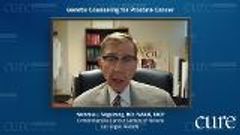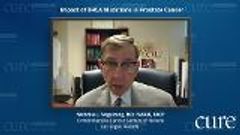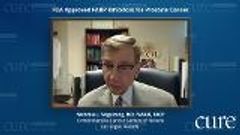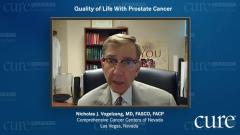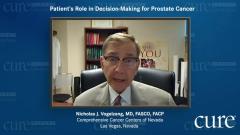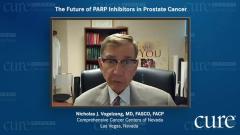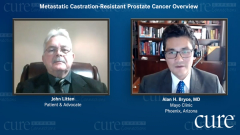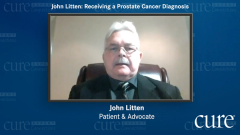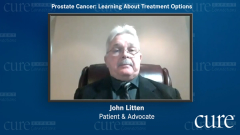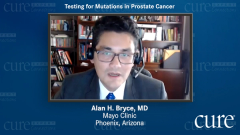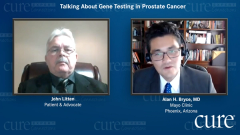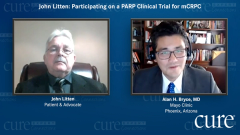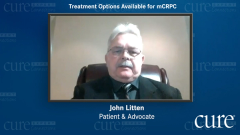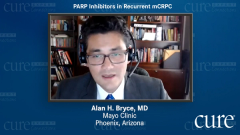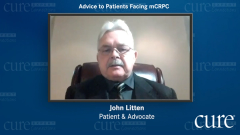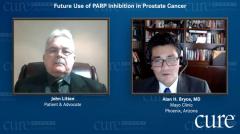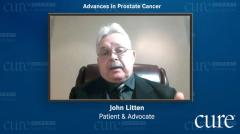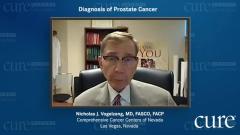
Talking About Gene Testing in Prostate Cancer
Episodes in this series

Alan H. Bryce, M.D.: Mr. Litten, could you talk about when we started to talk about genetic testing in your cancer. What were your impressions of that conversation at first? What ran through your head as I started talking about testing the genetics?
John Litten:I won’t say that I felt like I was going to be a guinea pig in a new series of testing. I certainly was interested, and it was relatively new. I would make sure the listeners understand just how intimately involved you are in the research side of cancer on a daily basis. When you would bring something forth to me, it was truly what I would consider cutting edge. It was the latest and greatest. Because I’ve been through three or four different processes from the initial pill form of chemotherapy to the heavy chemotherapy infusions—losing my hair, going through all of that, going through some fairly serious nausea periods and a lot of fatigue. When we got to the point where you were all over this new genetic testing and the possibilities and the fact that there were some human trials becoming available, you offered that to me. You said I want you to think about this, but I think this might really work well for you because, as it turns out, I did have that missing portion of the gene in my cancer cells, and I was a good candidate to move into the genetic trial of the PARP inhibitors. That’s been the most human trial, and I have been on it for going on 14 months. It’s done amazingly well in keeping my cancer at bay.
I would tell you that I listen to your advice because I had by that time the six and a half years of history of each process that you took me through. Each did the job of pushing my cancer back, reducing the size of my abdominal lymph nodes once it was identified as being there from the CT scans. Each process I went through seemed to work for a period until the cancer found out an immunity to it. Then it was time to move on to something else, so of course I was eager to move into genetic testing.
Alan H. Bryce, M.D.: That’s right. In this case it was the tumor specifically that had the mutation in the BRCA gene, in Mr. Litten’s case. As he said, part of the gene was missing, which was a mutation that we could exploit by targeting it with PARP inhibitors. In your case, the family testing, the germline testing, was negative, so you didn’t inherit this gene. Therefore, you couldn’t pass it on to your kids, but it occurred in the tumor. It occurred in the cancer as the cancer grew up. Did you feel like this was a difficult concept to work through? How did you talk about this with your family?
John Litten: I would call my caregiver, my daughter, who’s a trauma registered nurse in Eureka, California. She and I would spend hours on the phone. She would review everything that you said to me, and I gave her access to my patient portal. She’d review everything and look at my scans. Every time she was very encouraging to me about the type of treatment I was getting and that I was going down the right path. [I would] start to get frustrated, saying I don’t think I want to try this. It was similar to people who are currently concerned and are contracting the coronavirus. What do you have to lose? You should try to figure out what the newest is, what the best is. It didn’t hurt me a bit to try it. As a matter of fact, I’ve been amazed at how easy it’s been to be on this PARP inhibitor and not really have serious side effects.
Alan H. Bryce, M.D.: You’ve certainly done well. There’s no question in my mind that your commitment to maintaining a healthy lifestyle, to having a positive attitude, and to really engage in this with positivity and determination has served you well in all these eight years. You’re certainly an example. I also have no doubt that your daughter has played a big role in this, in keeping you positive and helping you through it.
John Litten: That’s right. She is a tiger. She isn’t going to allow me to have a down day. She makes sure it’s all squared away before we hang up that telephone. She’s been a great help to me. Likewise, Dr. Bryce, you have too. Everything has always been very positive, very encouraging. Getting the opportunity to try the human trial meant a lot to me. I thought, if others could learn something from me participating in the trial, that would be an honorable thing to do. What did I have to lose? I want to do whatever is the next new thing out there that’s going to give me a couple of more years of life. I’ve always been very positive about this. It’s important for those of you listening who have the cancer to understand there are a lot of doors out there that can be opened for you. You must keep your mind open to listening to what your oncologist says and moving through all the new things. There are new discoveries almost every month of things that help different people with different forms of this cancer. You should be encouraged that there’s so much more out there now than there was eight years ago when I started on this journey. It’s just amazing.
Transcript Edited for Clarity

